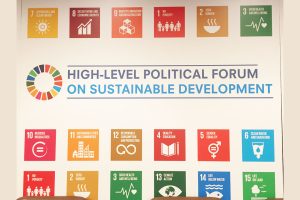July 2018: UN-Water has concluded one of three public dialogues on the ‘SDG 6 Synthesis Report 2018 on Water and Sanitation.’ The dialogue, which will continue through September, will canvass the following issues: overall feedback (moderated, 2 – 31 May); main messages for the High-level Political Forum (moderated, 25 June – 20 July); and looking forward and next steps (moderated, 31 August – 30 September).
The SDG 6 Synthesis Report offers the High-level Political Forum on Sustainable Development (HLPF) a progress report on the eight indicators under the clean water and sanitation Goal. The first dialogue focused on the collection of overall feedback on the report. It asked the questions: How did you like the report?; Are there areas, topics or messages that are missing from the report, or that you would like to highlight or modify in view of HLPF? and What could be improved in possible future editions of the report? Respondents’ comments will be presented in a separate publication at the conclusion of the dialogues.
Providing feedback in the online public dialogue, United Cities and Local Governments (UCLG) underscored that all investment in planned sanitation infrastructure, in collaboration with local and regional governments, can have positive externalities for human development and the achievement of SDG 6 and SDG 11 (sustainable cities and communities). UCLG explained that many local and regional governments are responsible for the provision of this service and they know better than any other tier of governance what vulnerable groups in what areas of the territory require more integration and better access to this service.
The Groundwater Solutions Initiative for Policy and Practice (GRIPP) proposed adding language related to the fact that SDG 6 and other cross-cutting targets within the SDG framework cannot be achieved without developing pro-active measures for groundwater management at all levels, including enhanced replenishment, demand management, protection, monitoring, reporting and enforcement. GRIPP further called upon the representatives of the respective custodian agencies to make an extra effort to further improve the step-by-step methodologies for the monitoring of SDG 6 target indicators, explaining that the currently proposed methodology generally recognizes the role of groundwater but may need to clearly specify the contribution of groundwater in the weighted calculations. By GRIPP’s intervention, the methodology should also include adequate groundwater measurement and monitoring methodologies to collect necessary data on a regular basis and in a way that can easily be applied at the national level.
Other stakeholders addressed issues related to, inter alia, the need to: better investigate the coherence among the SDG 6 targets within Goal 6; track the strength of enabling environments for private sector involvement, not just highlight the need for general cooperation with the private sector; include a stronger emphasis on water and sanitation as a human right; and include a stronger recognition of Indigenous Peoples as rights-holders. [UN Water Webpage] [Public Dialogues] [SDG Knowledge Hub Story on the SDG 6 Synthesis Report]

